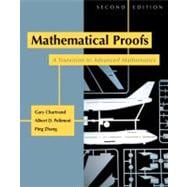
| Communicating Mathematics | |
| Learning Mathematics | |
| What Others Have Said About Writing | |
| Mathematical Writing | |
| Using Symbols | |
| Writing Mathematical Expressions | |
| Common Words and Phrases in Mathematics | |
| Some Closing Comments About Writing | |
| Sets | |
| Describing a Set | |
| Special Sets | |
| Subsets | |
| Set Operations | |
| Indexed Collections of Sets | |
| Partitions of Sets | |
| Cartesian Products of Sets | |
| Logic | |
| Statements | |
| The Negation of a Statement | |
| The Disjunction and Conjunction of Statements | |
| The Implication | |
| More On Implications | |
| The Biconditional | |
| Tautologies and Contradictions | |
| Logical Equivalence | |
| Some Fundamental Properties of Logical Equivalence | |
| Characterizations of Statements | |
| Quantified Statements and Their Negations | |
| Direct Proof and Proof by Contrapositive | |
| Trivial and Vacuous Proofs | |
| Direct Proofs | |
| Proof by Contrapositive | |
| Proof by Cases | |
| Proof Evaluations | |
| More on Direct Proof and Proof by Contrapositive | |
| Proofs Involving Divisibility of Integers | |
| Proofs Involving Congruence of Integers | |
| Proofs Involving Real Numbers | |
| Proofs Involving Sets | |
| Fundamental Properties of Set Operations | |
| Proofs Involving Cartesian Products of Sets | |
| Proof by Contradiction | |
| Proof by Contradiction | |
| Examples of Proof by Contradiction | |
| The Three Prisoners Problem | |
| Other Examples of Proof by Contradiction | |
| The Irrationality of …À2 | |
| A Review of the Three Proof Techniques | |
| Prove or Disprove | |
| Conjectures in Mathematics | |
| A Review of Quantifiers | |
| Existence Proofs | |
| A Review of Negations of Quantified Statements | |
| Counterexamples | |
| Disproving Statements | |
| Testing Statements | |
| A Quiz of “Prove or Disprove” Problems | |
| Equivalence Relations | |
| Relations | |
| Reflexive, Symmetric, and Transitive Relations | |
| Equivalence Relations | |
| Properties of Equivalence Classes | |
| Congruence Modulo n | |
| The Integers Modulo n | |
| Functions | |
| The Definition of function | |
| The Set of All Functions From A to B | |
| One-to-one and Onto Functions | |
| Bijective Functions | |
| Composition of Functions | |
| Inverse Functions | |
| Permutations | |
| Mathematical Induction | |
| The Well-Ordering Principle | |
| The Principle of Mathematical Induction | |
| Mathematical Induction and Sums of Numbers | |
| Mathematical Induction and Inequalities | |
| Mathematical Induction and Divisibility | |
| Other Examples of Induction Proofs | |
| Proof By Minimum Counterexample | |
| The Strong Form of Induction | |
| Cardinalities of Sets | |
| Numerically Equivalent Sets | |
| Denumerable Sets | |
| Uncountable Sets | |
| Comparing Cardinalities of Sets | |
| The Schroder-Bernstein Theorem | |
| Proofs in Number Theory | |
| Divisibility Properties of Integers | |
| The Division Algorithm | |
| Greatest Common Divisors | |
| The Euclidean Algorithm | |
| Relatively Prime Integers | |
| The Fundamental Theorem of Arithmetic | |
| Concepts Involving Sums of Divisors | |
| Proofs in Calculus | |
| Limits of Sequences | |
| Infinite Series | |
| Limits of Functions | |
| Fundamental Properties of Limits of Functions | |
| Continuity | |
| Differentiability | |
| Proofs in Group Theory | |
| Binary Operations | |
| Groups | |
| Permutation Groups | |
| Fundamental Properties of Groups | |
| Subgroups | |
| Isomorphic Groups | |
| Answers and Hints to Selected Odd-Numbered Exercises | |
| References Index of Symbols | |
| Index of Mathematical Terms | |
| Table of Contents provided by Publisher. All Rights Reserved. |
The New copy of this book will include any supplemental materials advertised. Please check the title of the book to determine if it should include any access cards, study guides, lab manuals, CDs, etc.
The Used, Rental and eBook copies of this book are not guaranteed to include any supplemental materials. Typically, only the book itself is included. This is true even if the title states it includes any access cards, study guides, lab manuals, CDs, etc.